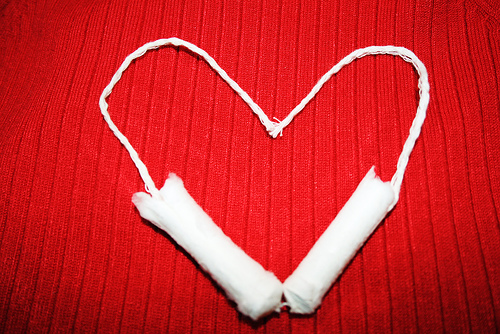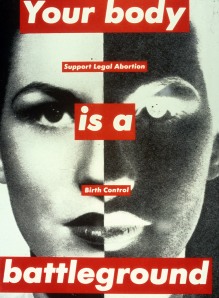Tagged: Caitlin Moran
Moonlighting and Menstruation
Caitlin Moran has a whole chapter about periods in her book, How To Be a Woman.
It’s brilliant shit. Her honesty is refreshing, if not at times blush-worthy — and well — kinda gross. But I like her for that. Jess DC of Lost Girls wrote a recent blogpost about it and made a telling statement.
It is unfortunate that so many of us grow up not in wonder and excitement about turning into women, but horrified at all the changes and taught to hide them (out of shame) as much as possible.
Jess is so right. And this is why I love Caitlin Moran. She’s honest. She’s open. And that honesty and openness makes puberty seem “doable.” Scary — but doable. And comforting in the knowledge the we ALL as women will bleed out of our vaginas and get boobies, among many other things. If only this book were appropriate for adolescent girls.
I was lucky that my mom was very open with me. When I was 8 years old, I picked up a copy of Time Magazine with a picture of a teen mom on the cover. This confused me immensely as I was taught that only married women had babies. Yes, I had it in my sweet little 8 year old brain that when you got married you magically became pregnant whenever you wanted. So my sister and I went to my mother and asked THE question. Or rather, questions.
How are babies made?
How does the baby get IN THERE?
How can she be pregnant without being MARRIED?
My mom looked at us in her motherly way and sighed.
“Well, girls,” she said. “After dinner tonight I think we need to have a lady talk.”
Oooooh. This sounded enticing. Special. Secretive.
After dinner my mom gathered us into our bedroom. She had a chalk board. And the woman launched into the story of sex. The details. How babies are really made. And she drew pictures. This was the craziest shit I’d ever heard… or seen.
And then.
The news.
We would eventually have periods. Yes. We would, in fact, bleed out of our vaginas once a month for about three or four decades of our life.
Holy shit. This was some big mother fucking news right here.
But my mom made everything okay. She reassured us. And even made it sound special. Having a parent who is matter-of-fact with the details and supportive is so essential for any girl approaching puberty.
And Moran obviously had the opposite experience.
My mother never told us about them [periods] –“I thought you’d picked it all up from Moonlighting,” she said vaguely.
Which is funny, of course. But the lack of information is what probably made the idea of menstruation all the more terrifying for Moran. But either way. Puberty sucks. It just does. And I love the following Moran quote.
Sex hormones are a bitch that have turned me from a blithe child into a bleeding, weeping, fainting washerwoman. These hormones do not make me feel feminine: every night, I lie in bed feeling wretched, and the bulge of my sanitary napkin in my knickers looks like a cock.
Yeah. Periods. They DO suck. But they’re doable. And having a period is kinda nice — especially when you don’t want to be pregnant.
Related articles
- Kamikaze Girls And Patriarchal Bullshit (porchphilosophy.com)
- My last book of 2012 (seejy.wordpress.com)
Kamikaze Girls And Patriarchal Bullshit
I figured it was time for me to read a book about being a woman — about feminism — about vagina-having humans.
Thus I picked up How To Be a Woman, by Caitlin Moran.
Impressed yet? Oh, you’re not? Well you should be. Because this is a good book (so far at least.) And being a woman means I gave birth (and yes, I know there are many women who choose not to do the baby thing) to three babies, and now I support those babies by working full-time, which means I don’t have much time to do a whole lot, so it’s pretty impressive that I can actually pick up a book and read it, much less write about it.
Now are you impressed?
Yeah, anyway.
So How To Be a Woman is Caitlin Moran’s book about well — being a woman — and feminism. In the prologue she laments about how feminism is becoming extinct — that feminism comes in waves — so many waves, in fact, that it’s now become an irrelevant “incoming tide.” Moran is not saying that feminism is irrelevant — only that it has become irrelevant in the eyes of society.
She opens with talking about her 13th birthday. Her changing body. Her reluctance to enter into that unknown terrain of womanhood.
…there is no crueler or more inappropriate present to give a child than estrogen and a big pair of tits.
And so it began. That foray into becoming a woman.
Then there are girls who do all they can to prevent womanhood from happening. Those who fly into denial.
There are those who try to stop it, of course: the teenage girls who try to buy themselves time by aggressively regressing back to their five-year old selves and becoming obsessed with “girliness,” and pink. Filling their beds with teddies, to make it clear there’s no room for sex. Talking in baby talk, so they aren’t asked adult questions. At school, I could see some of my contemporaries were choosing not to be active women — out there, making their own fate — but to be princesses, just waiting to be “found” and married, instead.
Then there are girls who physically try to stop their body from changing.
And at the most dysfunctional end, of course, there are the kamikaze girls who wade into war with their pituitary — trying to starve it or confuse it into defeat, with anorexia, or bulimia.
My god. She explains things so well. This battle with womanhood that we all as women confront at one point or another. The tragic part is that teenage girls are so busy battling it, that they don’t see that being a woman — as challenging and frustrating as it can be — is such an amazing, lovely, crazy experience.
But the problem with battling yourself is that even if you win, you lose. At some point — scarred and exhausted — you either accept that you must become a woman — that you are a woman — or you die. This is the brutal, root truth of adolescence — that it is often a long, painful campaign of attrition. Those self-harming girls, with the latticework of razor cuts on their arms and thighs, are just reminding themselves that their body is a battlefield.
But Moran goes on to say, that even those notable women who got it right — those women who mastered the battle cry — they themselves ended up being conquered and beat down by a society who abhors strong, leading women.
Show a pioneering hero — Sylvia Plath, Dorothy Parker, Frida Kahlo, Cleopatra, Boudicca, Joan of Arc — and you also, more often than not, show a girl a woman who was eventually crushed. Your hard-won triumphs can be wholly negated if you live in a climate where your victories are seen as threatening, incorrect, distasteful, or — most crucially of all, for a teenage girl — simply uncool. Few girls would choose to be right — right, down into their clever, brilliant bones — but lonely.
It sounds so hopeless for a girl approaching teenager-dom — that cliff where you’re forced to jump full-force into that gravity pulling pit of womanhood.
This all sounds so bad. So negative. But I promise you it’s not. It’s just the prologue — the introduction. But here’s why being a woman can be so terrifying. And it’s just the tip of the iceberg:
…we live in a climate where female pubic hair is considered distasteful, or famous and powerful women are constantly pilloried for being too fat or too thin, or badly dressed, then, eventually, people start breaking into women, and lighting fires in them.
And this my friends, is the broken windows theory of feminism. One neglected broken window on a house will eventually lead to trespassers, burglars and squatters. And according to Moran, that’s precisely what’s happening to feminism.
I’m done for now, because I’ve only read the prologue and I would like to read some more. But I leave with you this Caitlin Moran quote for you to ponder.
When the subject turns to abortion, cosmetic intervention, birth, motherhood, sex, love, work, misogyny, fear, or just how you feel in your own skin, women still won’t often tell the truth to each other unless they are very, very drunk.
So we must have a zero-tolerance policy on the squatters climbing into our broken windows — “a zero tolerance policy on ‘All the Patriarchal Bullshit.'”

